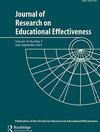Estimating the Importance of Families in Modeling Educational Achievement Using Linked Swedish Administrative Data
IF 1.6
4区 教育学
Q2 EDUCATION & EDUCATIONAL RESEARCH
Journal of Research on Educational Effectiveness
Pub Date : 2022-04-26
DOI:10.1080/19345747.2022.2054480
引用次数: 1
Abstract
Abstract While the family is a critical determinant of educational achievement, methodological difficulties and the availability of data limit estimation of the family contribution in school effectiveness models. This study uses multilevel modeling to estimate the proportion of variation in student educational achievement between families, family-level intraclass correlation coefficients, and specific family structure effects (family size, birth order, birth spacing, sibling sex ratio). We use cross-classified random effects to account for school and neighborhood variation. We analyze Swedish administrative education records linked with birth records for four academic cohorts of students, with siblings identified from a wider pool of 21 cohorts. We show that almost half of the variation in student achievement described as “between students” in traditional school effectiveness studies would be better described as variation “between families,” suggesting effectiveness research might give greater consideration to family-based interventions in tandem with existing student- and school-based approaches to raising low achievement.利用关联的瑞典行政数据评估家庭在教育成就建模中的重要性
摘要虽然家庭是教育成绩的关键决定因素,但方法上的困难和数据的可用性限制了学校效能模型中家庭贡献的估计。本研究使用多层次模型来估计家庭之间学生教育成绩的变化比例、家庭层面的类内相关系数和特定的家庭结构效应(家庭规模、出生顺序、生育间隔、兄弟姐妹性别比)。我们使用交叉分类的随机效应来解释学校和社区的变化。我们分析了四个学术群体的瑞典行政教育记录和出生记录,其中21个群体中有兄弟姐妹。我们发现,在传统的学校效能研究中,几乎一半被描述为“学生之间”的学生成绩差异可以更好地描述为“家庭之间”的差异,这表明效能研究可能会更多地考虑基于家庭的干预措施,以及现有的以学生和学校为基础的方法来提高低成绩。
本文章由计算机程序翻译,如有差异,请以英文原文为准。
求助全文
约1分钟内获得全文
求助全文
来源期刊

Journal of Research on Educational Effectiveness
EDUCATION & EDUCATIONAL RESEARCH-
CiteScore
4.00
自引率
11.10%
发文量
37
期刊介绍:
As the flagship publication for the Society for Research on Educational Effectiveness, the Journal of Research on Educational Effectiveness (JREE) publishes original articles from the multidisciplinary community of researchers who are committed to applying principles of scientific inquiry to the study of educational problems. Articles published in JREE should advance our knowledge of factors important for educational success and/or improve our ability to conduct further disciplined studies of pressing educational problems. JREE welcomes manuscripts that fit into one of the following categories: (1) intervention, evaluation, and policy studies; (2) theory, contexts, and mechanisms; and (3) methodological studies. The first category includes studies that focus on process and implementation and seek to demonstrate causal claims in educational research. The second category includes meta-analyses and syntheses, descriptive studies that illuminate educational conditions and contexts, and studies that rigorously investigate education processes and mechanism. The third category includes studies that advance our understanding of theoretical and technical features of measurement and research design and describe advances in data analysis and data modeling. To establish a stronger connection between scientific evidence and educational practice, studies submitted to JREE should focus on pressing problems found in classrooms and schools. Studies that help advance our understanding and demonstrate effectiveness related to challenges in reading, mathematics education, and science education are especially welcome as are studies related to cognitive functions, social processes, organizational factors, and cultural features that mediate and/or moderate critical educational outcomes. On occasion, invited responses to JREE articles and rejoinders to those responses will be included in an issue.
 求助内容:
求助内容: 应助结果提醒方式:
应助结果提醒方式:


